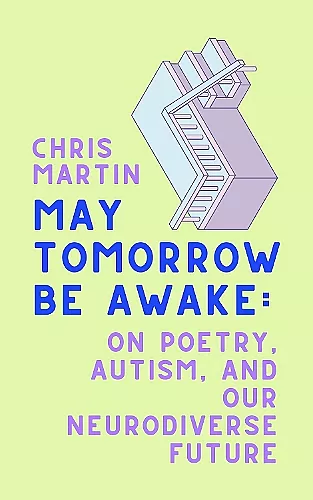May Tomorrow Be Awake
On Poetry, Autism, and Our Neurodiverse Future
Format:Hardback
Publisher:HarperCollins Publishers Inc
Published:15th Sep '22
Should be back in stock very soon

An author and educator’s pioneering approach to helping autistic students find their voices through poetry—a powerful and uplifting story that shows us how to better communicate with people on the spectrum and explores how we use language to express our seemingly limitless interior lives.
Adults often find it difficult to communicate with autistic students and try to “fix” them. But what if we found a way to help these kids use their natural gifts to convey their thoughts and feelings? What if the traditional structure of language prevents them from communicating the full depth of their experiences? What if the most effective and most immediate way for people on the spectrum to express themselves is through verse, which mirrors their sensory-rich experiences and patterned thoughts?
May Tomorrow Be Awake explores these questions and opens our eyes to a world of possibility. It is the inspiring story of one educator’s journey to understand and communicate with his students—and the profound lessons he learned. Chris Martin, an award-winning poet and celebrated educator, works with non-verbal children and adults on the spectrum, teaching them to write poetry. The results have been nothing short of staggering for both these students and their teacher. Through his student’s breathtaking poems, Martin discovered what it means to be fully human.
Martin introduces the techniques he uses in the classroom and celebrates an inspiring group of young autistic thinkers—Mark, Christophe, Zach, and Wallace—and their electric verse, which is as artistically dazzling as it is stereotype-shattering. In telling each of their stories, Martin illuminates the diverse range of autism and illustrates how each so-called “deficit” can be transformed into an asset when writing poems. Meeting these remarkable students offers new insight into disability advocacy and reaffirms the depth of our shared humanity.
Martin is a teacher and a lifelong learner, May Tomorrow Be Awake is written from a desire to teach and to learn—about the mind, about language, about human potential—and the lessons we have to share with one other.
“May Tomorrow Be Awake is stark and touchable portrait of tenderness that doesn’t treat living and loving as a challenge, even when it might be challenging. From sinking into this book, I learned how to be a better and more thoughtful steward of the world and the people closest to me. There is no greater gift than this one, to depart from a text with a cleaner, more generous view of living.” — Hanif Adurraqib, poet and author of A Little Devil in America and A Fortune for Your Disaster "By forming meaningful connections with non-speaking autistic poets and coming to understand the distinctive ways they employ the architecture of language to express themselves, Chris Martin has returned poetry to its primordial function -- as a domain of soul-making that can transform society." — Steve Silberman, author, NeuroTribes: The Legacy of Autism and the Future of Neurodiversity "A wondrous exploration of autistic creativity, and the mutual learning that becomes possible when we let go of ’normal’ and aim for authentic connection.” — Nick Walker, PhD, author of Neuroqueer Heresies "Every poem is deep with philosophical intuition from productive minds. I am so glad the poets have found an outlet in this book to be heard." — Tito Mukhopadhyay, poet and author of Teaching Myself to See and How Can I Talk If My Lips Don’t Move “A sensitive celebration of neuroscientific difference. Martin’s message is not only about unleashing the potential of autistic individuals, but creating a world where ‘different modes of movement, of communication, of being and signing and pointing and singing and ticcing and typing’ affords all people a new vision ‘of what it means to be human.’” — Kirkus “Martin braids contemporary neurological research and literary theory in this eloquent reflection on his experience teaching poetry to neurodiverse students. . . . [His] narration is empathetic and charming, and his students’ writings combine to offer moving, intelligent, insightful pathways for understanding different minds. The result brilliantly proves that nonverbal doesn’t mean voiceless.” — Publishers Weekly
ISBN: 9780063020153
Dimensions: 210mm x 140mm x 28mm
Weight: 445g
336 pages